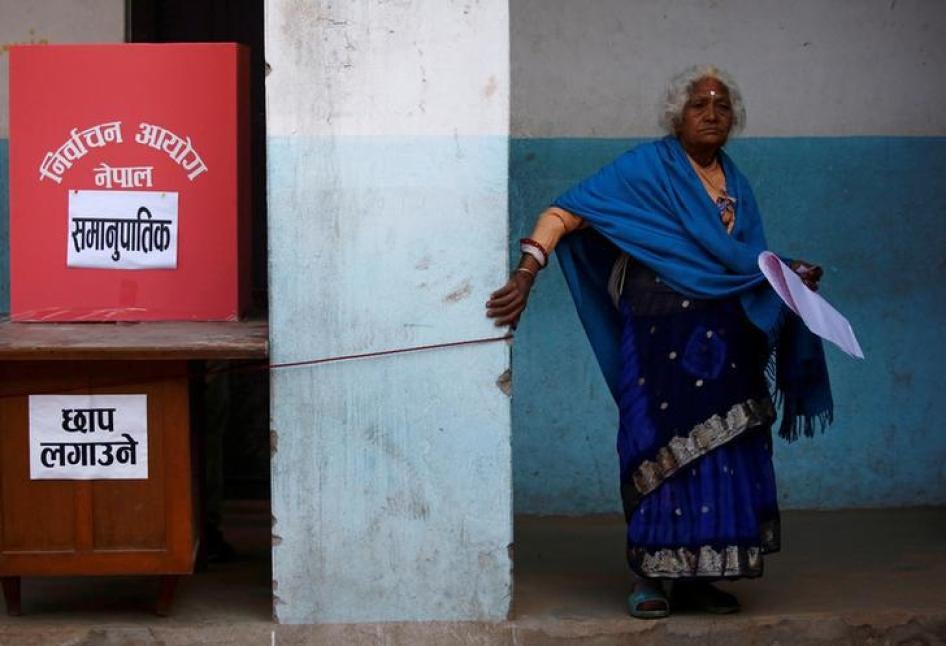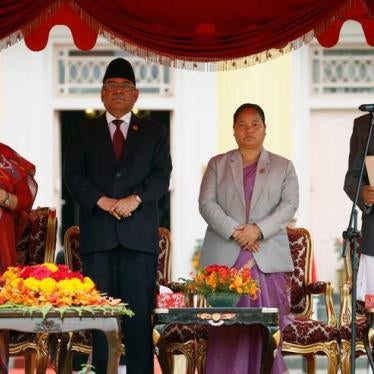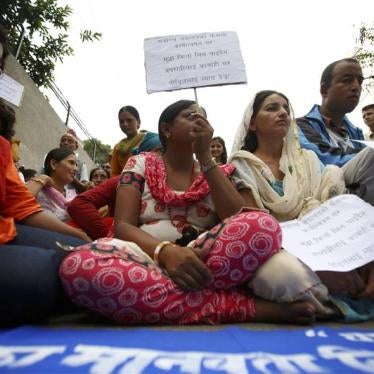|
Commentary
An Election in Nepal, Decades in the Making
Can It Bring Stability When the Country Has Yet to Heal From the Wounds of War?
Published in:
Foreign Affairs
When Nepalis head to the polls today for the final round of parliamentary elections, the country’s first since 1999, it will be hailed as a historic step forward—the start of a new democratic era for a country that has suffered from years of violence, instability, and government ineptitude. That step is worth celebrating, since there is reason to hope that better governance will come. But hope for the future should not obscure the challenging legacies of the past. The wounds of Nepal’s long civil war are not yet healed, and if the new political leadership does not do more to deliver justice for the war’s victims, new friction is likely to emerge.
Addressing the legacies of Nepal’s past won’t be easy with the massive challenges that lie ahead: deep-seated political rivalries; ethnic, class, and regional divisions; and a lack of justice for victims of war crimes. But attempting to simply move forward won’t make them go away; it will ensure that they bring greater problems down the road.
Since the end of its decade-long civil war in 2006, the country’s main political parties have let Nepalis down, spending more time bickering about their roles in the country’s many interim governments than on addressing crippling poverty and strengthening broken institutions. The country lacks electricity, roads, and critical infrastructure such as hospitals and schools. Its police, courts, and civil service are often unable to function at even a basic level. After the April 2015 earthquake, which killed more than 9,000, injured tens of thousands, and destroyed much of the country’s already poor infrastructure, the government was so dysfunctional that the delivery of life-saving foreign aid was delayed and in some cases even refused.
The country’s biggest parties—the Nepali Congress, the Communist Party of Nepal (Unified Maoist-Leninist, or UML), and the Communist Party of Nepal (Maoist Center)—share the blame for the failed governance. They have functioned in various coalitions since the end of the civil war, but have focused more on political feuding than on running the country. Decisions on key issues such as the development of hydropower, for example, have been delayed for years because the Maoists, which have close ties with Beijing, advocate for Chinese investment, while the Nepali Congress, with long historical ties to India, prefers that such projects remain domestic, citing concerns that a large Chinese role will lead to a loss of sovereignty.
This dispute is but one example of how Nepal grapples with the fierce competition between China, the regional superpower, and India, with whom it is united by shared history and culture. Beijing is also concerned with how Nepal deals with bordering Tibet—it has insisted that Kathmandu arrest Tibetan activists within its borders and has even stationed Chinese police on the Nepalese side of the Tibetan border to seize political refugees.
Another challenge for Nepal is addressing the grievances of its long-marginalized communities, which if left unaddressed could lead to renewed civil conflict. This problem is particularly acute in the Terai, a large region in the foothills of the Himalayas along the Indian border. Marginalized groups in the Terai, including Madhesis and Tharus, live in what are known as the plains. They have long been pushed out by the wealthier people of the hills, who dominate in the government, the army, and society at large. People in the Terai rightly complain of systematic discrimination and a lack of historical representation in national government and politics. This dynamic has created the biggest fault line in Nepali politics, as people in the Terai expect the new federal state to devolve real powers to the local government to address underrepresentation at the federal level and in the civil service, as well as to devote significant public resources to improve the region’s economy and its health and education systems.
Many in the Terai are still unhappy with the way the country has been carved up into seven new states, saying that they have been gerrymandered to ensure control by people from the hills. They also strongly resent the national government, especially after protests erupted in 2015 over provisions in the new constitution that many in the Terai claimed would perpetuate discrimination in favor of the elites in Kathmandu. The government responded to the strikes by ordering curfews and declaring certain areas off limits, causing intense economic hardship. Cross-border trade with India plummeted, leading to severe shortages of fuel and other essentials across the country. In the end, after Nepali authorities responded to the demonstration with force, 45 people were killed, including some police officers and children. As with most serious human rights abuses in Nepal, the security forces were not held accountable.
Such official impunity risks upending Nepal’s stability and political progress. But it is a problem that dates back to the civil war. During the brutal conflict, both sides committed atrocities and systematic abuses. The military and police were determined to crush the Maoist rebellion, which they considered a terrorist movement. The insurgents would target anyone who worked for or was seen as collaborating with the government. The United Nations, Human Rights Watch, brave local human rights groups, and others documented widespread extrajudicial killings, rapes, disappearances, abductions, and torture by both government soldiers and rebels. By its end, the conflict had claimed the lives of at least 13,000.
Despite repeated promises, the government has held almost no one on either side accountable. Most victims have yet to receive the reparations that they have been promised. One former Minister of Home Affairs, who at the time oversaw the police force, told me that he personally felt that members of the Maoists and Nepalese army should be held accountable for the atrocities they committed during the war. But, he lamented, “I have no power. The parties have all the power. I am just sitting here until the parties resolve their differences or one of them defeats the others. But even then, you should know that none of them care about justice for victims.”
That is because since the end of the war, the army and Maoists have worked jointly to block effective and impartial investigations and prosecutions of war crimes, seeking, instead, to give amnesty to leaders and combatants on each side. Nepalese Supreme Court rulings in 2014 and 2015 deemed amnesty illegal, but the government has ignored those judgements. In May 2016, in a cynical political move designed to protect the human rights abusers, then Prime Minister Khadga Prasad Oli of the UML signed an agreement with the other main political parties, agreeing to withdraw all wartime cases before the courts and to grant amnesty to alleged perpetrators, including political leaders, members of the security forces, and former Maoist combatants.
In May 2017, UN High Commissioner for Human Rights Zeid Ra’ad Al Hussein expressed concern about the state of the reconciliation process. In particular, he criticized the government’s neglect of the Truth and Reconciliation Commission and the Commission on Investigation of Enforced Disappeared Persons, both of which were promised under the Comprehensive Peace Agreement of 2006 to address accountability for human rights violations and abuses that took place during the conflict. He noted, for example, that the commissions “suffer a considerable lack of resources, knowledge, and credibility.” The UN Human Rights Committee has also repeatedly held that Nepal was in breach of its human rights obligations. Most recently, in July 2017, it called upon the Nepali authorities to investigate and prosecute those responsible for rape in the case of Purna Maya, the pseudonym for a woman who was raped and tortured by Nepalese soldiers in 2004.
The new government should expect a strong and renewed push for justice from victim groups. There is a huge demand for it. Despite the time and cost of filing complaints, the Truth and Reconciliation Commission has received nearly 60,000 complaints and the Disappeared Commission has received about 3,000. The first step requires the government to establish an independent office to prosecute crimes that are referred to it by the two justice commissions. Then it must repeal or amend its current law regarding amnesty in order to comply with the Supreme Court’s directives. The government should offer victims witness protection so that more will come forward; this will enable the police to identify perpetrators. It should also adopt legislation to prosecute cases of torture, enforced disappearances, and similar atrocities. Meanwhile, it should lift the statute of limitations on the investigation and prosecution of such crimes, including for rape and gender-based and sexual violence. Finally, the government should pay full reparations to all victims and their families. If it does not honor promises to victims, such as taking action against the many violent criminals still in the security forces, Nepal could return to conflict should its fractious politics break down again someday.
Elections give hope for a better future. But to take advantage of that promise, Nepal needs to account for the many wrongs of its past—or else that better future may never arrive.
Your tax deductible gift can help stop human rights violations and save lives around the world.
Most Viewed
-
November 25, 2019
A Dirty Investment

-
June 3, 2025
“They’re Ruining People’s Lives”

-
December 21, 2023
Meta’s Broken Promises

-
January 25, 2024
“We’re Dying Here”

-
February 19, 2018
“All We Want is Equality”






